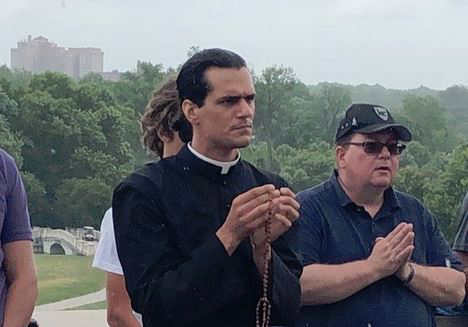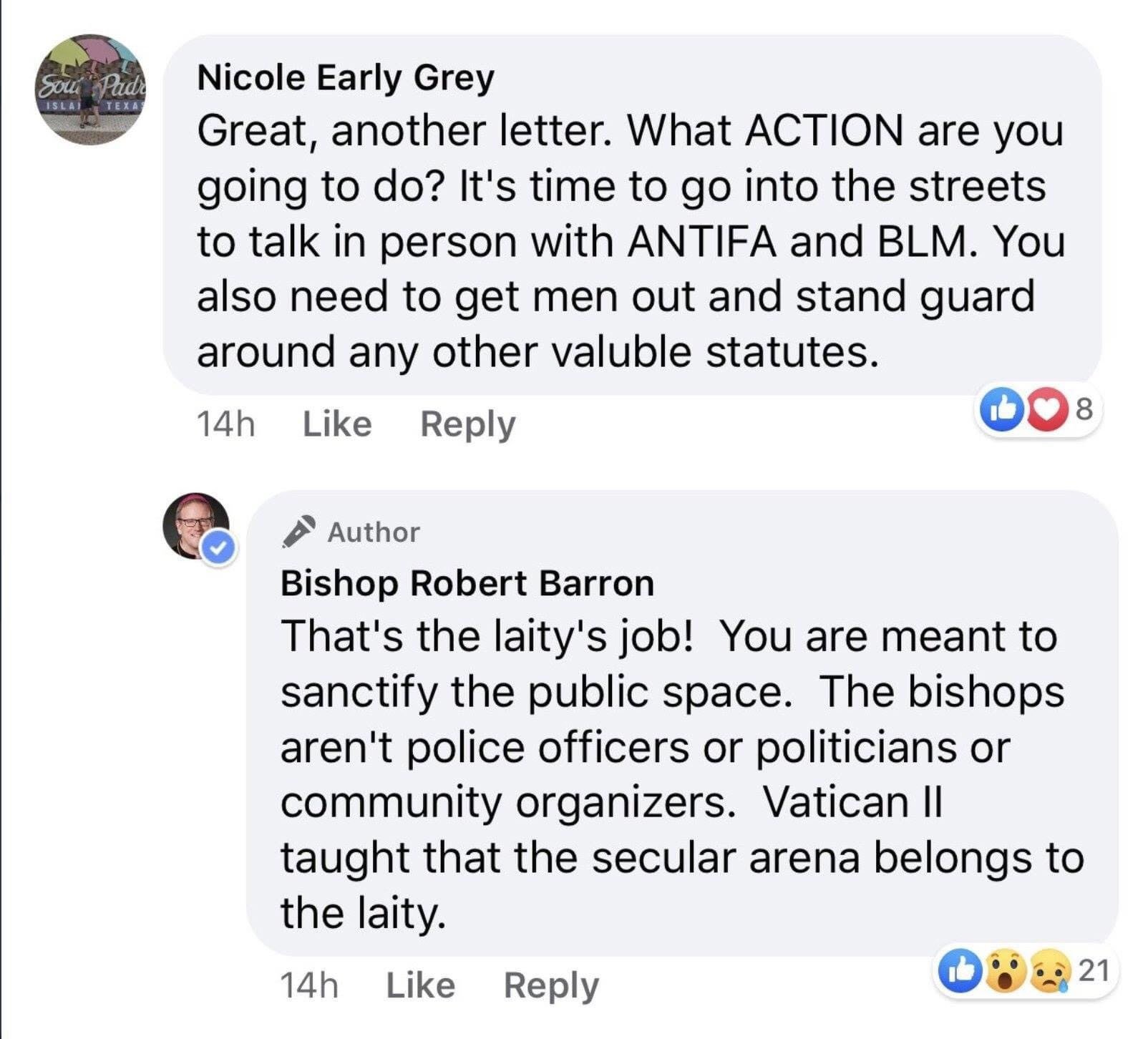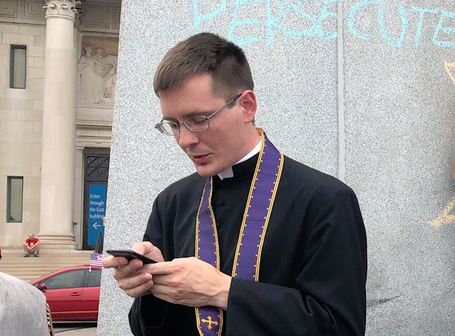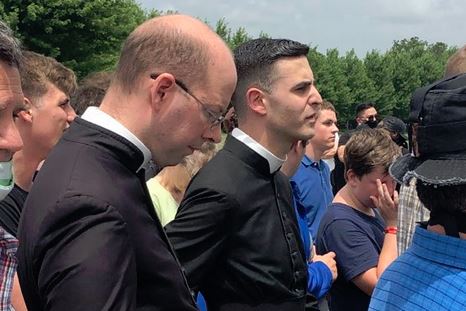Our purpose in holding this Rosary event at the statue of St. Louis was to satisfy the two greatest commandments: to love God and to love our neighbor as ourselves. To that end, we prayed equally for everyone present at the event:
- For those who attacked us and called us names
- For those who falsely accused us of being in the KKK
- For those on both sides of the issues who came to provoke the other side
- For those police officers who donned riot gear on a hot, humid day to keep us all safe
- For those who came out to pray
For all of them, we prayed to God that He softens our hearts and fills our souls with gifts of the Holy Spirit.
Secondarily, we prayed for the preservation of the statue.
We prayed for the statue because we believe that the statue will inspire people to learn about and imitate the man it represents: St. Louis IX, King of France. We believe that people who live like St. Louis lived will wind up in heaven for eternity. We believe this despite knowing that some of King Louis IX’s actions as king sound abhorrent to modern ears. As the St. Louis Archdiocese stated:
St. Louis is an example of an imperfect man who strived to live a life modeled after the life of Jesus Christ. For St. Louisans, he is a model for how we should care for our fellow citizens and a namesake with whom we should be proud to identify.
The Archdiocese reminds us that St. Louis, despite normal human flaws, was immensely charitable king:
The reforms that St. Louis implemented in French government focused on impartial justice, protecting the rights of his subjects steep penalties for royal officials abusing power, and a series of initiatives to help the poor.
King Louis IX’s renowned work in charity helped elevate him to Sainthood. His daily suppers were shared with numerous beggars, whom he invited to the royal table. On many evenings, he would not let them leave before he washed their feet. He personally paid to feed more than 100 poor Parisians every day. His care for the sick was equally moving; St. Louis frequently ministered to lepers & created hospitals, including one for ex-prostitutes.
Even his decisions that some moderns find repulsive were taken with the intent of leading more souls to heaven.
Therefore, we prayed that the statue of St. Louis survives in order to fight the enemy, Satan, by inspiring more people to follow St. Louis’s example of justice, mercy, and love of neighbor.
(Read the Archdiocese’s full statement here.)
But, God’s Will, Not Ours #
A remarkably brave and energetic priest, Fr. Samuel Miloscia traveled from Kansas City to St. Louis to lead the faithful in prayer. He said, “you are doing God’s work.”

Fr. Miloscia leads the Joyful Mysteries at the statue of St. Louis.
I hope so.
I preceded the Rosary with a plea to God for humility. The humility to recognize that we humans are powerless and that anything we do without His guidance ends in sin and failure.
Though we believe that the statue will lead souls to Christ, let God’s will prevail, not ours. We could be wrong, though there’s no evidence that we are.
God Bless These Priests #
Last week, Bishop Robert Barron issued a tweet that I’m sure he regrets.
When asked by a faithful Catholic why he and his fellow bishops were not actively defending churches and monuments from desecration, Bishop Barron responded:
That’s the laity’s job!

A low point for Bishop Robert Barron.
Apparently, Bishop Barron believes the Second Vatican Council forbade priests from taking public stands for or against the desecration of sacred art. Fortunately, some priests still choose to lead.

A brave priest , Fr. Stephen Schumacher, stands between angry protesters and the statue of St. Louis.
Four priests attended Saturday’s Rosary. Father Miloscia, whom we mentioned earlier, traveled from Kansas City. His family came out, as well. They’re from the St. Louis area. The three other priests apparently came from St. Francis de Sales Oratory run by the priests of the Institute of Christ the King.

Holy priests, reportedly of the Institute of Christ the King, provide clerical guidance to Catholics praying for the preservation of a saintly statue.
It’s hard to explain how happy and relieved the Catholic laity felt upon seeing their collars and cassocks. While the laity should, indeed, carry Christ to the public square, we are prone to greater error than devout and holy priests. Moreover, lack of priestly leadership leads both the faithful and their opponents to question whether our actions are truly in accord with Church teaching.
We all want to thank and pray for these four wonderful men of God who ignored episcopal calls to “leave it to the laity.” They demonstrated heroic humility and zeal by leading us in prayers and hymns. God bless them.
The Only Conflict Was Between God and Satan Fought on Our Plane #
St. Louis Police decided they needed to stand between protestors and a small group of Christians who gathered to pray the Rosary. God bless those officers. The temperature was over 90 degrees, and they were in full riot gear.
The conflict arose after a local activist started petition drives to tear down a statue and rename the city.
The press loves conflict and confrontation, of course, and its treatment of the event would indicate that conflict was its end.
It was not.
The purpose of the gathering was love. Let me explain.
Love of Neighbor Is to To Will the Good of the Other #
Jesus declared," ‘Love the Lord your God with all your heart and with all your soul and with all your mind.’ This is the first and greatest commandment. And the second is like it: ‘Love your neighbor as yourself.'… —Matthew 22:37-39
The first and greatest commandment is to love God with all our hearts, souls, and minds. The second is to love our neighbor as ourselves.
The Theologians teach us that the second commandment, as understood by early Christians, was ordered toward God, not toward other men. In other words, we are to love our neighbor as ourselves for God’s sake, not for our sakes nor our neighbors’.
To love one’s neighbor for God’s sake is to will our neighbor’s ultimate good. And the ultimate good is to share forever God’s glory in heaven.
Willing the good for one’s neighbor, then, intends wanting his salvation. Satisfying this commandment requires that we treat our neighbor with his salvation in mind. That is why Christ tells us to pray for our enemies.
Two Kinds of Enemies #
When Jesus tells us to love and pray for our enemies, He means to love and pray for people who oppose us. People, somewhat erroneously, call people who oppose us “enemies.”
In fact, our only enemy is the enemy of God, the angel who chose eternal separation from God. The dark angel who said, “I will not serve.”
Jesus is not calling us to love Satan. In fact, by loving our human “enemies,” we are fighting the enemy. Satan wants to destroy God’s beloved humanity, one soul at a time.
We believe that those who provoke or commit violence, those who seek to destroy monuments, those who wish to erase history and deny free speech and association, are cooperating with evil. They are not intrinsically evil people; they are lost souls who find solace and comfort from the father of lies, a master at convincing humans God has abandoned them. Feeling abandoned, some people choose the safety promised by demons.
For these poor souls we pray.
God sent His only Son to teach us how to avoid the evil one and live forever in glory. When we love and pray for our “enemies,” we are doing God’s will by winning souls. In the process, we love our neighbors by helping them escape an eternity in hell.
That’s what love of neighbor means: helping people escape hell. And that is why we prayed at the statue of St. Louis on Saturday—in hopes of actively cooperating in God’s will by helping souls find Him through Christ.
P.S. If anyone know the brave two brave priests we could not identify, please let me know by email (bill@billhennessy.com) or in the comments. I’d like them to get personal credit for their courage.
